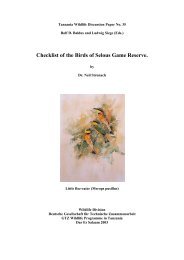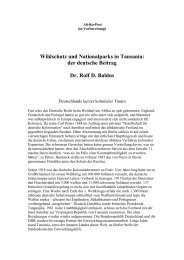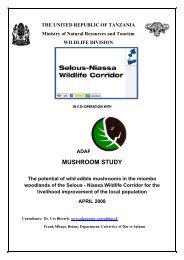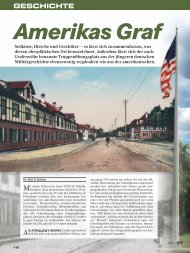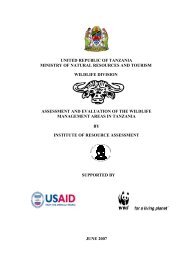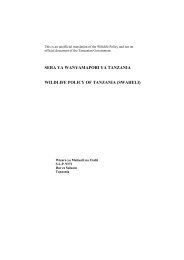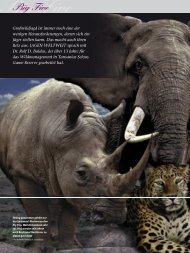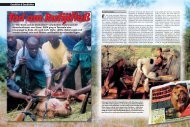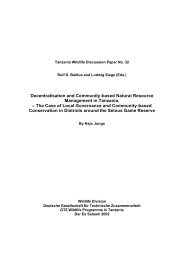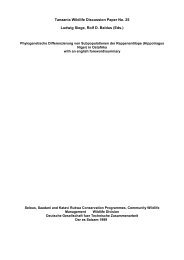African Indaba Articles - wildlife-baldus.com
African Indaba Articles - wildlife-baldus.com
African Indaba Articles - wildlife-baldus.com
You also want an ePaper? Increase the reach of your titles
YUMPU automatically turns print PDFs into web optimized ePapers that Google loves.
conservation based on international sustainability standards, accepted by international organizations, andpractical proposals for its implementation. A second three-day conference with global expert attendance willbe held in Brussels in July this year. The symposium on recreational hunting on October 12 th and 13 th , 2006in London (see <strong>African</strong> <strong>Indaba</strong> 4/2) organized by the IUCN Sustainable Use Specialist Group, the ZoologicalSociety of London and supported by CIC (with CIC Director Kai Wollscheid on the organization <strong>com</strong>mittee)will certainly be a logical and essential continuation of this discussion.Last not least I would like to use a little of your time for some thoughts on hunting trophies and trophyhunting!Hunting in Protected AreasBy Cleve CheneyEditor’s Note: With Cleve Cheney’s article we continue the discussion about hunting in National Parks.Cleve Cheney is a regular contributor to magazines like Game & Hunt, Africa’s Bowhunter, <strong>African</strong> Archer &Adventurer. He has been in conservation for 27 years. Almost 20 years were spent with the South <strong>African</strong>National Parks Board - most of this time in the Kruger National Park as a <strong>wildlife</strong> researcher and wildernessranger. Cleve has extensive experience in <strong>wildlife</strong> management, game capture, and hunting, both with bowand rifle. He has been an avid bow hunter for 22 years and his recognized bow hunting course has areputation for setting the highest of standards. Apart from this, Cleve offers a series of CD-ROM basedinteractive learning material with individual CDs dealing with issues like tracking skills, dangerous <strong>African</strong>game, shot placement for guides and hunters, bow hunting guide to Africa, advanced field guiding, managinggame farms for bowhunting, wilderness survival, etc. The individual CDs can be ordered directly from CleveCheney at cceagleswing@mweb.co.za.As a trails ranger working in the Kruger National Park, I was often asked the following question: “why can aquota of elephants that are to be culled not be set aside for legal hunting purposes?” I found it very difficult toanswer – for three reasons: firstly I owed loyalty to SANParks, secondly the National Parks Act states that nohunting may be allowed in a National Park, and thirdly, I found it very difficult to defend an issue for whichthere was no real logic.Emotions aside and looking at the issue realistically one sees that <strong>African</strong> conservation bodies are in afinancial crisis. The main reason for this is that conservation funding by central governments has be<strong>com</strong>e alow priority issue in <strong>com</strong>parison to the pressing social needs of burgeoning human populations. As a resultunder funded national and provincial conservation agencies are forced to be<strong>com</strong>e self-sufficient. This leadsto conservation <strong>com</strong>promises and the very mandate of conservation bodies to manage wild systemsresponsibly be<strong>com</strong>es a political casualty as sacrosanct ecological principles are sacrificed to meet budgets.The foundation principle of habitat preservation should never have been sacrificed on the altar of mammon.Destroy habitat and all that follows will die!Instead of keeping wild areas undeveloped and wild the relentless monster of development rolled on,destroying and devouring more and more habitat. Concessions were sold to the highest bidders and theydeveloped wild lands that were once untouchable. Tourist lodges were built (often in the most unspoiledwilderness areas) and by their very presence destroyed the wilderness essence. More roads opened up forgame drive vehicles to traverse and to provide access to hitherto inaccessible wild places – inaccessible,other than on foot, that is. More gravel pits were excavated for soil to maintain roads, sewage systems put inplace and rubbish disposal pits dug to ac<strong>com</strong>modate the human waste created by the lodges. Traffic levelsincreased with game drive vehicles and to keep the lodges supplied with guests and provisions. The impactof ecotourism development and operation is significant – a pervasive cancer eating away at wildernessatmosphere and physical habitat.Accepting the fact that conservation will never again be a high priority in the eyes of <strong>African</strong> politicalleaders and that funding from central governments will never amount to much, it is time to get real and dosome environmental auditing. What hangs in balance is something that is almost irreplaceable – unspoiled70



